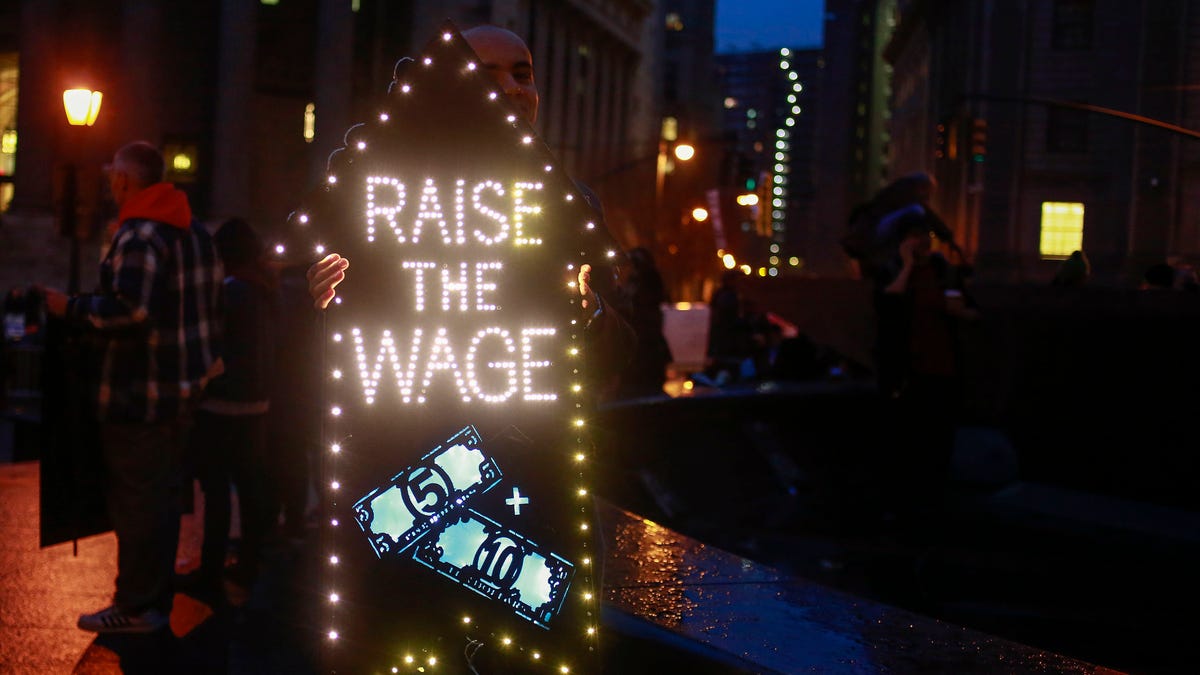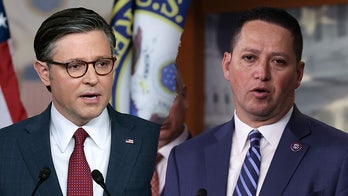
Dec. 5, 2013: Demonstrators gather during a nationwide strike and protest at fast food restaurants to raise the minimum hourly wage to $15 in New York. (Reuters)
WASHINGTON – Hourly workers who rely on tips for a living are turning to the states in a bid to boost their base pay, as the minimum wage debate stalls in Congress -- though business groups warn the move could backfire.
Amid resistance from the restaurant lobby and elsewhere, groups that represent bartenders, baggage handlers, nail techs and servers say they don't want to be left out of legislation to increase the minimum wage.
They won an initial victory earlier this week. Lawmakers in New Jersey advanced a bill Monday that would raise the Garden State’s minimum hourly wage for tipped workers -- which stands at $2.13 an hour -- to $3.39 by the end of this year, and to $5.93 by 2015, a nearly 180 percent increase over two years.
The bill’s sponsor, Democratic Assemblywoman Shavonda Sumter, said the intent “is to make sure we’re at least providing decent wages for people who serve as our waiters and waitresses.”
Advocates of boosting the minimum wage for tipped workers say raising the rate would give people who are struggling a shot at a more stable life. Some states already have a relatively high minimum wage for those workers, but the rate is different all over the country.
“No one can survive on tips and $2.13 an hour, and no one should have to,” Maria Myotte, spokeswoman for Restaurant Opportunities Centers United, told FoxNews.com. “At that wage, even with tips, New Jersey’s efforts to put more money in the pockets of their tipped workers, but businesses can afford to do more and pay all their workers a living wage.”
But as anyone who's worked a restaurant job knows, servers don't actually make $2.13 an hour. Opponents of the latest push warn increasing the wage could end up triggering firings and causing business owners to severely scale back their workforce. Restaurants already operate on slim profit margins, so higher base pay for servers, for instance, means they would have to find the money from somewhere.
“Tipped employees at restaurants are among the highest-paid employees in the establishment, regularly earning between $16 and $22 an hour,” Christin Fernandez, a spokeswoman from the National Restaurant Association, told FoxNews.com. “Nobody is making $2.13 an hour. If an employee’s tips plus their cash wages don’t add up to least the minimum wage, their employer is responsible for bringing the employee up to the required minimum.”
In New Jersey, the employer is required to make up the cost to tipped workers who earn less than the state minimum wage of $8.25. The U.S. Department of Labor considers tipped employees those who receive more than $30 per month in tips.
Amid the pushback, the state is among several stepping in to pass laws that would up the wage for tipped workers, a category that includes jobs from bellhops to exotic dancers.
The first federal minimum wage for tipped workers was created by Congress in 1966. The rate was set at a fixed percentage of the overall minimum wage, which meant both climbed in tandem. But that has been frozen at $2.13 an hour since 1991.
Democrats in Pennsylvania moved in the opposite direction from New Jersey -- introducing legislation that would end the tipped minimum wage altogether, while also boosting the regular minimum wage.
On the federal front, President Obama says he supports legislation in Congress that would raise the federal minimum wage rate to $10.10 an hour from $7.25. He made a fresh push to help tipped workers on Wednesday, with a White House report that calls for more than doubling that wage to $4.90 by 2016.
Congressional legislation, introduced by Sen. Tom Harkin, D-Iowa, and Rep. George Miller, D-Calif., originally called for increasing tipped workers’ base wage to $6.85 from $2.13 per hour over the next five years -- but House members stripped it, before voting down a minimum wage bill entirely earlier this month.
Currently, Washington state has the highest minimum wage for tipped employees at $9.32, according to the Department of Labor.
Six others -- Oregon, Nevada, California, Montana, Alaska and Minnesota – guarantee the full state minimum wage to tipped workers.
Maryland Democrat Rep. Donna Edwards has joined the push to promote an increase in the minimum wage for tipped workers in her state, and says she hopes it will inspire a similar increase on a federal level.
According to a 2009 National Employment Law Project report, the tipped minimum wage of $2.13 has lost 36 percent of its value in real terms since it was established in 1991. “As a result, waitresses and waiters suffer three times the poverty rate compared to the overall workforce,” Edwards said in a written statement to FoxNews.com.
The National Restaurant Association, though, says it is against the current Harkin-Miller bill in Congress.
“This could significantly limit the entry-level opportunities businesses can provide, and as a result, hurt those without the skills or experience and looking to enter the workforce,” Fernandez said. “We already have a disparity between the front of the house and the back of the house.”
The Senate’s minimum wage bill is pending in the Finance Committee.




